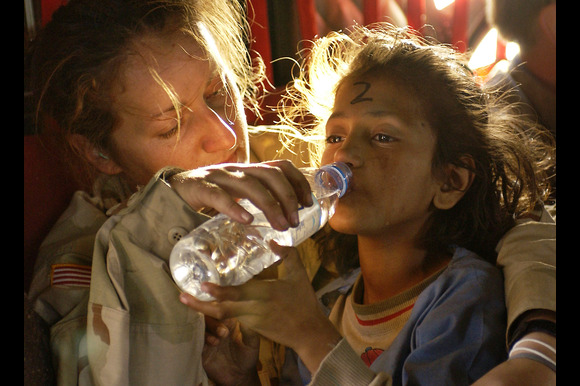A humanitarian convoy has successfully reached Syria’s predominantly Druze Suwayda province, amid urgent warnings from the United Nations that the humanitarian crisis remains severe following last week’s deadly clashes that displaced over 120,000 people and left essential infrastructure in shambles.
The fighting, which erupted on July 13 and persisted for a week before a ceasefire was brokered, initially involved armed confrontations between local Druze militias and Sunni Bedouin tribes — long-standing rivals in the region. However, the conflict quickly escalated when Syrian government forces intervened on the side of the Bedouin factions, according to multiple reports.
On Monday, Syrian state television aired footage of a Syrian Arab Red Crescent convoy entering the province, carrying critical supplies. According to the state-run SANA news agency, the 27-truck convoy delivered “200 tonnes of flour, 2,000 shelter kits, 1,000 food baskets,” along with additional food and medical aid.
The operation was described as a joint effort between “international organisations, the Syrian government and the local community,” reflecting a coordinated response to the unfolding emergency.
UN: Humanitarian Access Severely Limited
Despite the truce largely holding, the UN Office for the Coordination of Humanitarian Affairs (OCHA) stated the situation on the ground remains “critical amid ongoing instability and intermittent hostilities.”
“Humanitarian access remains constrained due to roadblocks, insecurity, and other impediments, making it difficult for aid workers to properly assess needs and deliver life-saving assistance on a broad scale,” the UN agency said.
The recent violence has crippled Suwayda’s access to water and electricity and created severe shortages of food, medicine, and fuel. Local news outlet Suwayda24 described the province’s condition as dire, emphasizing that the region needs significantly more aid deliveries to meet growing needs.
The outlet reported widespread protests on Monday across the province, where civilians demanded increased humanitarian assistance. A day earlier, civil and humanitarian organizations issued a stark warning about a looming “humanitarian catastrophe,” claiming that the province is under an intensifying siege imposed by state authorities, which has led to acute scarcities in basic supplies.
Conflicting Reports on Road Access
While local groups and monitors say the Suwayda-Damascus highway remains blocked by pro-government armed factions — preventing goods from entering the region — Syrian officials claim otherwise. On Sunday, Suwayda’s provincial governor Mustafa al-Bakkur told SANA that aid convoys were entering the province “normally,” insisting that “roads are unobstructed for the entry of relief organisations.”
However, the UK-based Syrian Observatory for Human Rights contradicted those claims, stating that although government forces are now deployed in various parts of Suwayda, aid continues to be delayed due to the ongoing closure of key routes and interference from government-affiliated armed groups.
The clashes, which left more than 250 people dead, mark one of the bloodiest outbreaks of violence in the region in recent years and pose a serious challenge to Syria’s fragile post-war recovery process. According to the UN’s International Organization for Migration, the conflict has displaced at least 128,571 individuals.
Israel Launches Strikes, Cites Protection of Druze
The situation further escalated when Israel intervened, launching a series of airstrikes on Syria’s Ministry of Defence buildings in central Damascus. Israeli forces also struck Syrian government positions in Suwayda province, saying the military action was intended to protect the Druze population, whom Israel refers to as its “brothers.”
The Israeli intervention drew strong international criticism and prompted diplomatic reactions from key regional powers.
Russia and Turkiye Urge Respect for Syrian Sovereignty
In response to Israel’s military actions, Russian President Vladimir Putin, a key backer of former Syrian President Bashar al-Assad, underscored the importance of Syria’s territorial integrity in a phone call with Israeli Prime Minister Benjamin Netanyahu. According to a Kremlin readout, Putin emphasized that any long-term political stability in Syria must respect “the interests of all ethnic and religious groups.”
Turkiye also weighed in at the UN Security Council, calling for an immediate halt to Israeli military activities in Syria and a renewed focus on supporting the Syrian government’s stabilization efforts.
“Going forward, maintaining de-escalation and preventing further Israeli aggression are vital,” said Turkish Deputy Foreign Minister Nuh Yilmaz during a UN briefing. “We must support Damascus in its attempts to restore order in Suwayda and protect civilians.”
Yilmaz accused Israel of showing a blatant disregard for international norms, describing the recent airstrikes on the presidential complex and the Defence Ministry as “a dangerous escalation.”
He added that recent improvement in the situation had been made possible through joint efforts involving the US and other international partners. However, humanitarian agencies continue to urge caution and sustained international attention, warning that the crisis in Suwayda is far from over.






